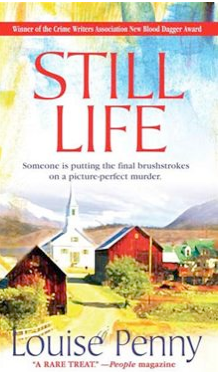A sweet-sour “womens” tea cozy genre mystery novel about a Murder in Three Pines village - don’t go shopping for a country home in this town. I warned you.
 |
Oh my. What a strange, haunting, cozy/dark detective series. Cutesey gentrified Quebec village, flakey croissant and lavish bistro dining interludes are juxtaposed with raw revelations of turbulent human emotion and behavior. A benevolent, wise, unjaded superintendent anchoring the investigations. Quirky village inhabitants involved with higher information age self-realization pursuits. Their interior lives and personal relationships are deftly revealed; they are not spared their pains and insecurities despite their "good life" environment. A nasty successful poet is tolerated by her neighbors. Teenage boys throw manure and curses at the gays who run the B&B. A troubled teen lies about his father. Another painter's mother kept snakes in the basement.
Clara is the touchstone of the village, an artist who gets food in her hair when she eats. We're still supposed to find her charming anyway, and do. Her successful artist husband Peter is brooding and arrogant, I think, and yet she seeks him always. It's she who "solves" the mystery , because she is the princess who can discern the pea beneath the twenty mattresses; she notices an subtle change in her dead friend's last painting which reveals the killer.
I like the way that art and appearances are written about in this novel particularly well. The author has the unique gift to describe appearances that become visual after the text, not an easy task. The murdered spinster's oeuvre, I imagine to be a fusion of Magritte, Grandma Moses, and James Ensor, based on the description, and it's very engaging and funny, too.
Canadian vernacular references go undefined but add color. What is a licorice pipe? What would one order from Eaton's Catalog?
Whimsical, funny, political, and philosophical/poetic author's voice comments are leavened into the chapters as well, making the novel work on narrative and emotional levels. It's not flat, procedural, or distanced. Rather, the reader pulls back from the revelations and human mistakes made, and it's Gamache, kind, avuncular, priest-like, who seems to bless away the pain, not without grieving himself, however. He remains, finally, merely authoritative, a man one doesn’t cross.
I am going to have to wait a bit before I read the next one, though. The creepy fallout from this novel is going to linger in my memory |
No comments:
Post a Comment